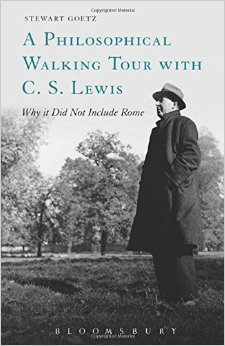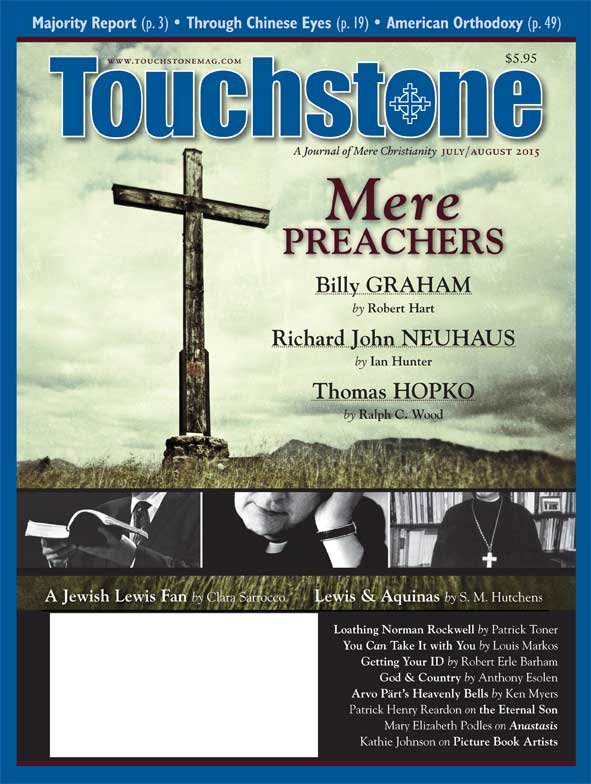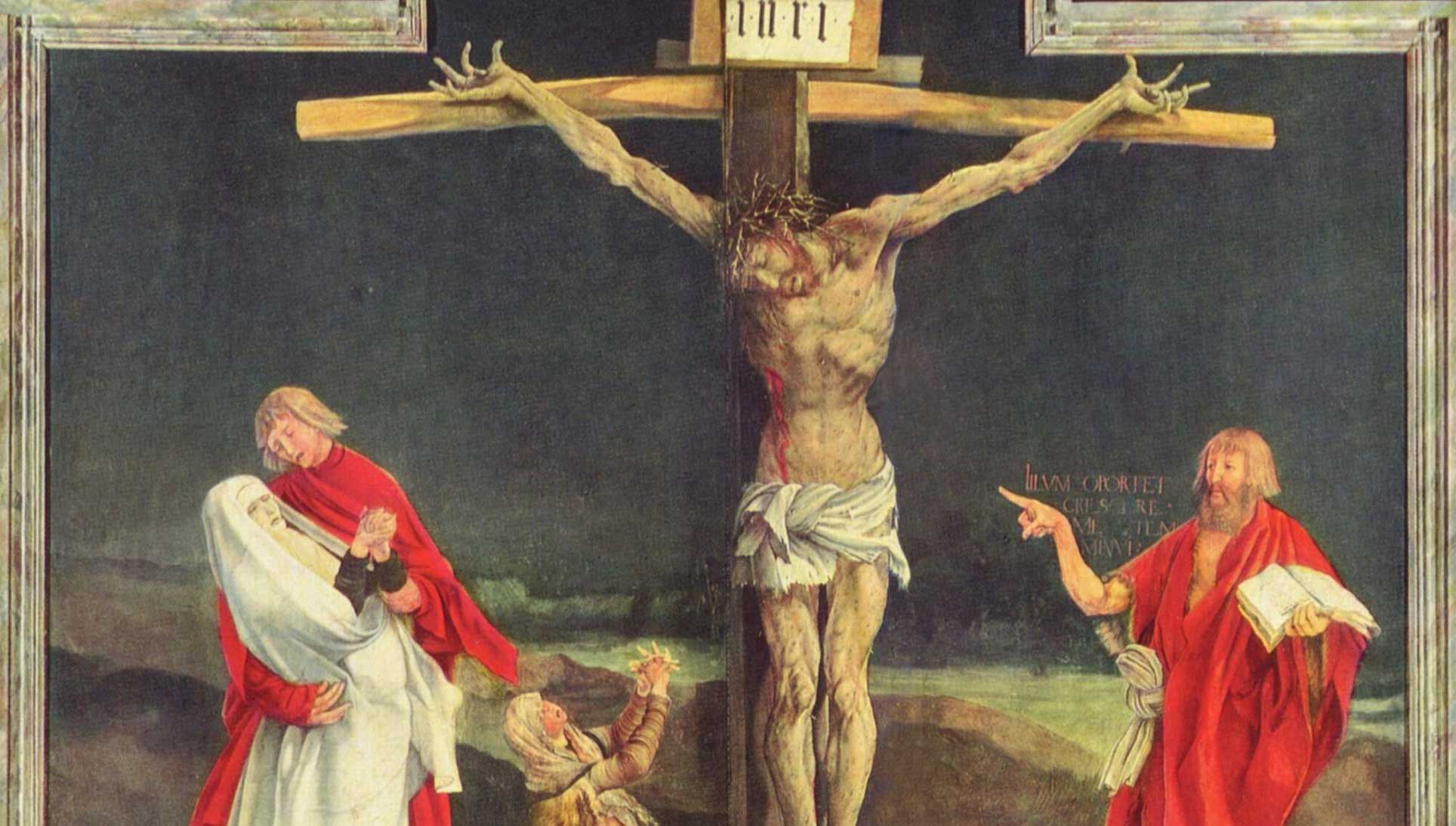Book Review
Stalled by
An Ox
A Philosophical Walking Tour with C. S. Lewis: Why It Did Not Include Rome by Stewart Goetz
Bloomsbury, 2015
(190 pages, $29.95, paperback)
reviewed by S. M. Hutchens

Stewart Goetz's Philosophical Walking Tour with C. S. Lewis, significantly subtitled, Why It Did Not Include Rome, is another contribution, and here a credible one, to the Why-C. S. Lewis-Did-Not-Become-a-Catholic genre. There are many Catholics who have difficulty understanding why Lewis, given the depth of his knowledge and spiritual acuity, did not see or could not accept what they behold in the glory of Rome. Just what were the moral, intellectual, or perceptual defects that made Lewis remain Protestant, particularly curious in someone so highly developed in each sphere?
Catholic Answers
Near the end of the book Goetz reviews the major proposals: Lewis simply thought that "Rome was wrong" (Thomas Howard). Christopher Derrick believes Lewis had not traveled enough—that had his British parochialism been exposed to continental Catholicism, his horizons may have expanded enough to make the claims of the Catholic Church believable to him. Joseph Pearce thinks the recalcitrance came from the anti-Catholic bigotry of Ulster that penetrated to the bone and never left him. James Como postulates that Lewis avoided the truth because his vocational aspirations in the British academy, his popular appeal, and the sales of his books, would have suffered had he converted. John Randolph Willis says the problem was that Lewis "had no sense of, and no interest in history." Knowledge of the broader landscape of human events would have helped show him the significance of the Catholic Church. Goetz adds to this list that Lewis's belief in "mere Christianity," that is, the Church as he, with many Protestants, perceived it manifest among us, foreclosed any particular church's exclusive claim to universality, even Rome's, and made the Anglicanism in which he found himself during his lifetime a comfortable enough home.

The Heart of the Matter
However much there might be to any of these proposals—and Goetz is not impressed with the ones based on character flaws—he believes they have all missed the most significant reason for Lewis's forbearance:
My claim is that while [perennial Catholic-Protestant disagreements] were real issues for Lewis, their intellectual status was secondary in nature. What more deeply troubled Lewis were Aquinas's, and thus the Roman Catholic Church's, positions on the primary philosophical issues of the nature of happiness, pleasure, pain, and the soul, body, and person. These were more fundamental matters for him because they concern ideas that are conceptually presupposed by theological topics of interest to ordinary people before they encounter the Christian gospel. . . . My earlier emphasis on the fact that Lewis was first and foremost a philosopher warrants repeated stress here, particularly for those who are of an evangelical theological persuasion . . . [for] Lewis was not an evangelical of the [sola scriptura] sense. As a philosopher, he believed the mind can know something about the just-mentioned topics by means of the natural light of reason alone as it manifests itself in common sense. . . . Given his philosophical conviction about the fundamental soundness of reason, which is common to all persons prior to any initiation into theological matters, Lewis regarded theological concerns as secondary in nature when it came to assessing his difference with the Roman Catholic Church (11).
A Mildly Irritated Footnote
This would seem a convenient point to insert an excursus of which I need to deliver myself, since I have three times in about as many months encountered in the writings of learned non-Protestants this fascinating creature, the Evangelical Christian, "inclined to hold, if he does not actually believe, that knowledge about good and evil [etc.] can only be had through reading Scripture and having one's mind enlightened via an understanding of it." I must say that in my own going to and fro on the Evangelical earth I have never encountered this beast—although I have not gone everywhere, so cannot say with complete assurance that there is no such thing. Perhaps some bold apologist has actually found one out in the woods and has the head on his trophy wall.
S. M. Hutchens is a senior editor and longtime writer for Touchstone.
subscription options
Order
Print/Online Subscription

Get six issues (one year) of Touchstone PLUS full online access including pdf downloads for only $39.95. That's only $3.34 per month!
Order
Online Only
Subscription

Get a one-year full-access subscription to the Touchstone online archives for only $19.95. That's only $1.66 per month!
bulk subscriptions
Order Touchstone subscriptions in bulk and save $10 per sub! Each subscription includes 6 issues of Touchstone plus full online access to touchstonemag.com—including archives, videos, and pdf downloads of recent issues for only $29.95 each! Great for churches or study groups.
Transactions will be processed on a secure server.
more on C. S. Lewis from the online archives
more from the online archives
calling all readers
Please Donate
"There are magazines worth reading but few worth saving . . . Touchstone is just such a magazine."
—Alice von Hildebrand
"Here we do not concede one square millimeter of territory to falsehood, folly, contemporary sentimentality, or fashion. We speak the truth, and let God be our judge. . . . Touchstone is the one committedly Christian conservative journal."
—Anthony Esolen, Touchstone senior editor














